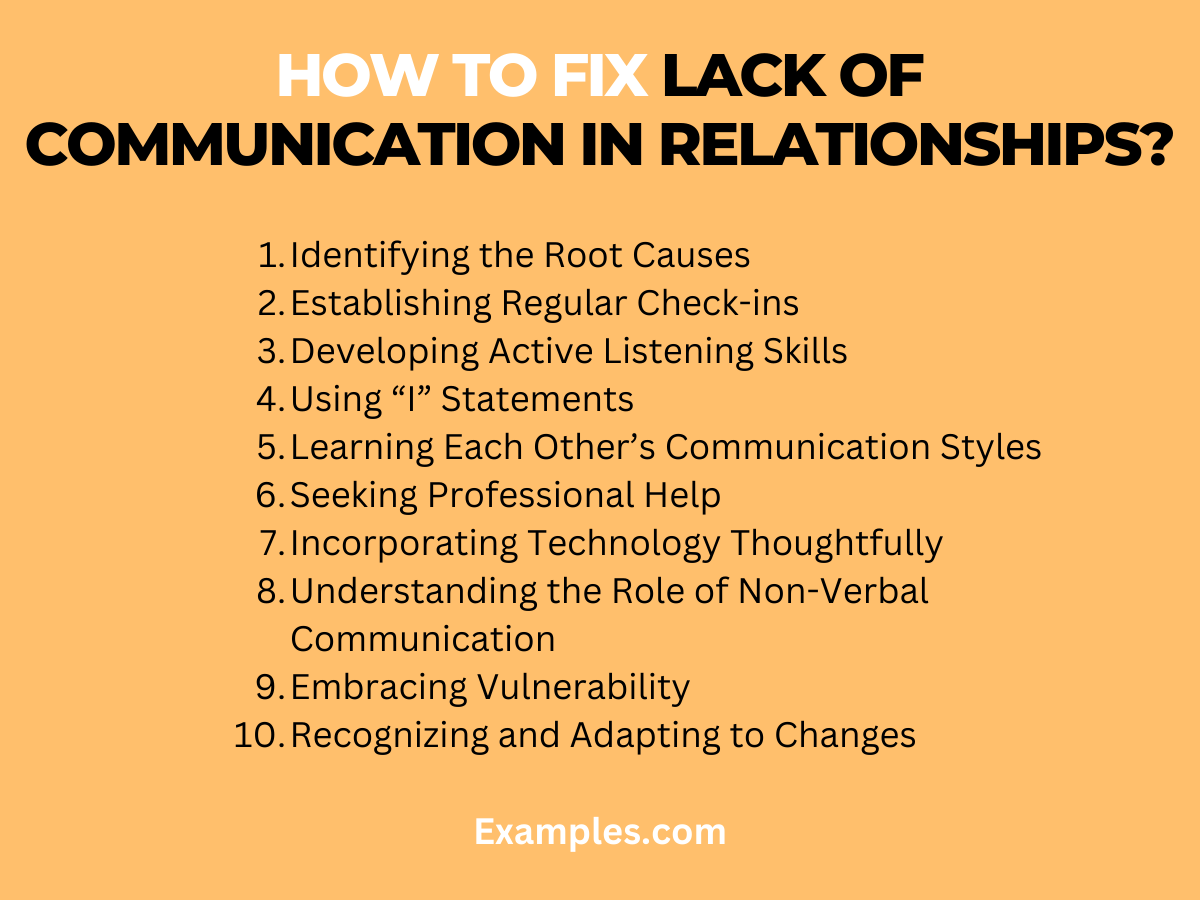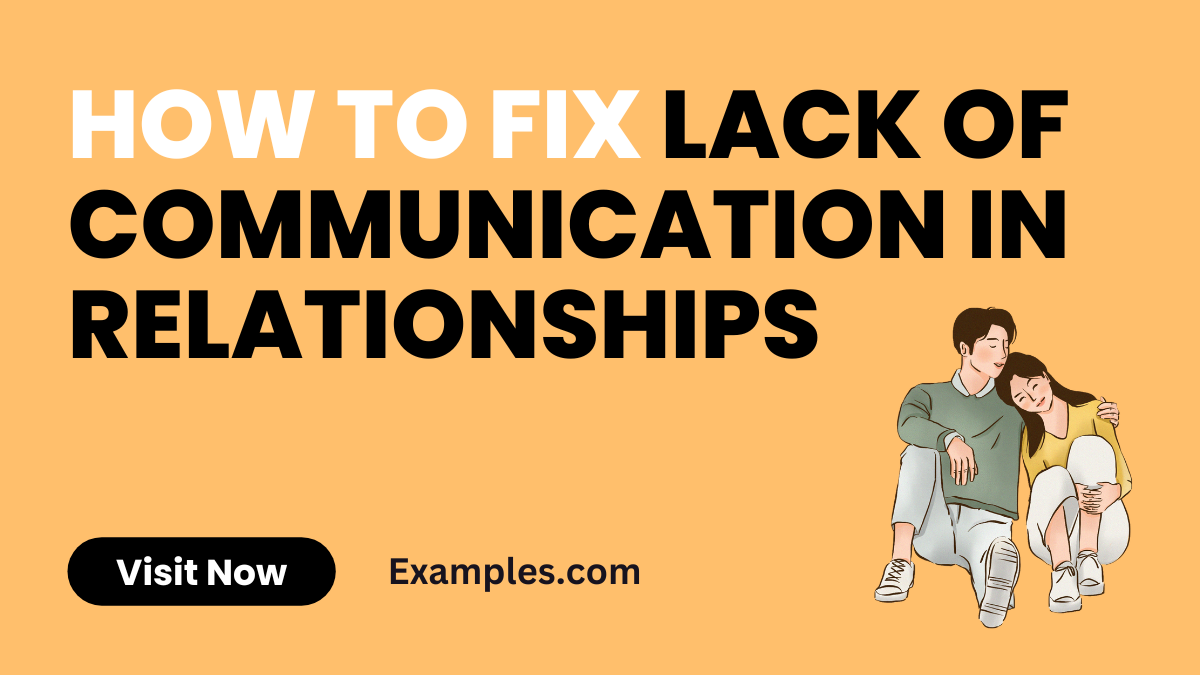How to Fix Lack of Communication in Relationships – 9+ Examples, Tips
Overcoming lack of communication in relationships is a journey many couples face. This comprehensive guide illuminates the path to better understanding and connection. Through real-life examples and insightful tips, you’ll discover effective strategies for enhancing communication skills, both verbal and non-verbal. Whether in a budding romance or a long-term marriage, the guidance provided here aims to strengthen bonds by addressing and resolving communication challenges, ensuring a healthier, more fulfilling partnership.
Common Communication Problems in Relationship
Communication problems are common in many relationships, and they can manifest in various ways. Here are some common communication issues that couples often face:
- Poor Listening: One of the most prevalent problems is not listening actively. This means not paying full attention when your partner is speaking, interrupting, or being preoccupied with your thoughts.
- Assumptions and Mind-Reading: Couples sometimes assume they know what their partner is thinking or feeling without actually asking or discussing it. This can lead to misunderstandings.
- Avoidance: Some individuals tend to avoid difficult or uncomfortable conversations altogether. They may suppress their feelings or concerns, which can lead to pent-up frustration.
- Criticism: Criticizing or attacking your partner’s character instead of addressing specific behaviors or issues can be damaging to communication. It can make your partner defensive and hinder productive conversations.
- Stonewalling: Stonewalling occurs when one partner withdraws from a conversation, refusing to engage or respond. This can leave the other person feeling unheard and frustrated.
- Blame and Defensiveness: Partners may engage in a cycle of blame and defensiveness, where each person points fingers at the other instead of taking responsibility for their own contributions to the issue.
- Lack of Clarity: Communication can break down when messages are vague or unclear. It’s essential to express yourself in a way that your partner can easily understand.
- Emotional Flooding: When emotions run high during a conversation, it can be challenging to communicate effectively. People may become overwhelmed and struggle to express themselves calmly.
- Nonverbal Communication: Misinterpreting nonverbal cues, such as body language and facial expressions, can lead to misunderstandings. These cues are an important part of communication.
- Ignoring Emotional Needs: Partners may not acknowledge or validate each other’s emotions and feelings, which can create emotional distance.
- Different Communication Styles: People often have different communication styles based on their upbringing and personality. These differences can lead to clashes in how they express themselves and interpret messages.
- Digital Distractions: In the digital age, constant connectivity through smartphones and other devices can interfere with face-to-face communication. Partners may be distracted by screens during important conversations.
Impacts of Lack of Communication in a Relationship
- Emotional Distance: When partners stop sharing thoughts and feelings, emotional intimacy declines.
- Resentment: Unresolved issues can lead to bitterness and resentment.
- Conflict Escalation: Minor misunderstandings can escalate into major conflicts.
- Loss of Trust: Without open communication, trust can erode over time.
- Decreased Satisfaction: Overall relationship satisfaction tends to diminish when communication is lacking.
How to Fix Lack of Communication in Relationships?

1. Identifying the Root Causes
Lack of communication in a relationship often stems from underlying issues such as fear of confrontation or different communication styles. Understanding these causes is crucial for addressing communication gaps. By acknowledging these underlying factors, couples can work towards a solution that addresses the core of their communication struggles.
2. Establishing Regular Check-ins
Creating a routine for regular check-ins can significantly improve communication. These dedicated times allow both partners to share their thoughts and feelings, ensuring that small issues don’t escalate into larger problems. It’s a proactive approach to maintain healthy lines of communication.
3. Developing Active Listening Skills
Active listening is a vital component of effective communication. It involves fully concentrating, understanding, responding, and then remembering what is being said. This practice helps in understanding your partner’s perspective and demonstrates empathy, a key factor in resolving lack of communication causes & reasons.
4. Using “I” Statements
Using “I” statements helps in expressing feelings without blaming the partner. This technique reduces the likelihood of the partner becoming defensive and encourages a more open and honest dialogue. It’s a constructive way to express concerns without triggering conflict.
5. Learning Each Other’s Communication Styles
Everyone has a unique way of communicating. Understanding your partner’s style, whether it’s direct, reflective, or emotive, can help in tailoring your communication approach for better clarity and understanding.
6. Seeking Professional Help
Sometimes, professional guidance from a counselor or therapist is needed to bridge the gap in communication. They can provide unbiased advice and strategies tailored to your specific situation, helping to overcome lack of communication in marriage or long-term relationships.
7. Incorporating Technology Thoughtfully
In today’s digital age, technology can either aid or hinder communication. Using it thoughtfully, like sending supportive texts or sharing articles that resonate, can enhance communication. However, it’s important to avoid over-reliance on digital communication, especially for significant conversations.
8. Understanding the Role of Non-Verbal Communication
Non-verbal cues, such as body language and lack of eye contact in communication, play a significant role in conveying messages. Being mindful of these cues can help in interpreting unspoken feelings and addressing them appropriately.
9. Embracing Vulnerability
Being open and vulnerable with your partner strengthens trust and fosters deeper understanding. It’s about sharing fears, hopes, and dreams, which can significantly reduce misunderstandings and feelings of disconnection.
10. Recognizing and Adapting to Changes
Relationships evolve, and so do communication needs. Recognizing and adapting to these changes is key to maintaining a strong connection. It involves being open to new methods of communication and being flexible in your approach.
By addressing these aspects, couples can effectively tackle the challenge of how to fix lack of communication and foster a stronger, more understanding relationship.
Why Is Communication Important in a Relationship?
Communication is critically important in any relationship, including marriage. Here are several reasons why communication plays a pivotal role in the success and health of a relationship:
- Understanding and Connection: Communication allows partners to understand each other better. It’s through conversation that you learn about each other’s thoughts, feelings, and experiences, which fosters a deeper emotional connection.
- Conflict Resolution: Effective communication is key to resolving conflicts and disagreements. When couples can openly discuss their issues and concerns, they are more likely to find mutually agreeable solutions.
- Trust: Trust is built on honesty and transparency. When partners communicate honestly and openly, trust is reinforced, and both individuals feel more secure in the relationship.
- Emotional Support: Communication provides a platform for emotional support. When one partner is going through a tough time, being able to talk about their feelings and concerns with their spouse can provide comfort and reassurance.
- Shared Goals: Effective communication allows couples to align their goals and aspirations. It ensures that both partners are on the same page regarding their future plans, such as career goals, family planning, and financial decisions.
- Intimacy: Communication is essential for maintaining emotional and physical intimacy in a relationship. Sharing desires, needs, and fantasies can enhance the romantic aspect of the partnership.
- Preventing Misunderstandings: Misunderstandings can lead to unnecessary conflicts. Clear communication helps prevent these misunderstandings by ensuring that both partners are on the same wavelength.
- Problem-Solving: Partners can work together to solve problems when they communicate effectively. This is especially important when facing challenges or making important decisions.
- Quality Time: Communication often goes hand in hand with spending quality time together. Engaging in meaningful conversations can strengthen the bond between partners.
- Adaptation and Growth: People change and evolve over time. Effective communication allows partners to adapt to these changes and grow together rather than grow apart.
Tips for Better Communication in Relationship
Improving communication in a relationship requires consistent effort. Here are some practical tips:
- Use “I” Statements: Focus on your feelings and perspectives to avoid blame.
- Listen Without Judging: Approach conversations with an open mind and avoid making judgments.
- Avoid Distractions: Engage in conversations without the interference of technology or other distractions.
- Practice Empathy: Try to understand your partner’s point of view, even if you disagree.
- Be Patient: Good communication takes time and practice, so be patient with yourself and your partner.
Fixing lack of communication in relationships requires empathy, active listening, and understanding each other’s communication styles. By embracing these strategies, couples can overcome barriers, enhance mutual understanding, and foster a healthier, more fulfilling relationship. Remember, effective communication is a skill that, when nurtured, can profoundly transform your connection with your partner.



